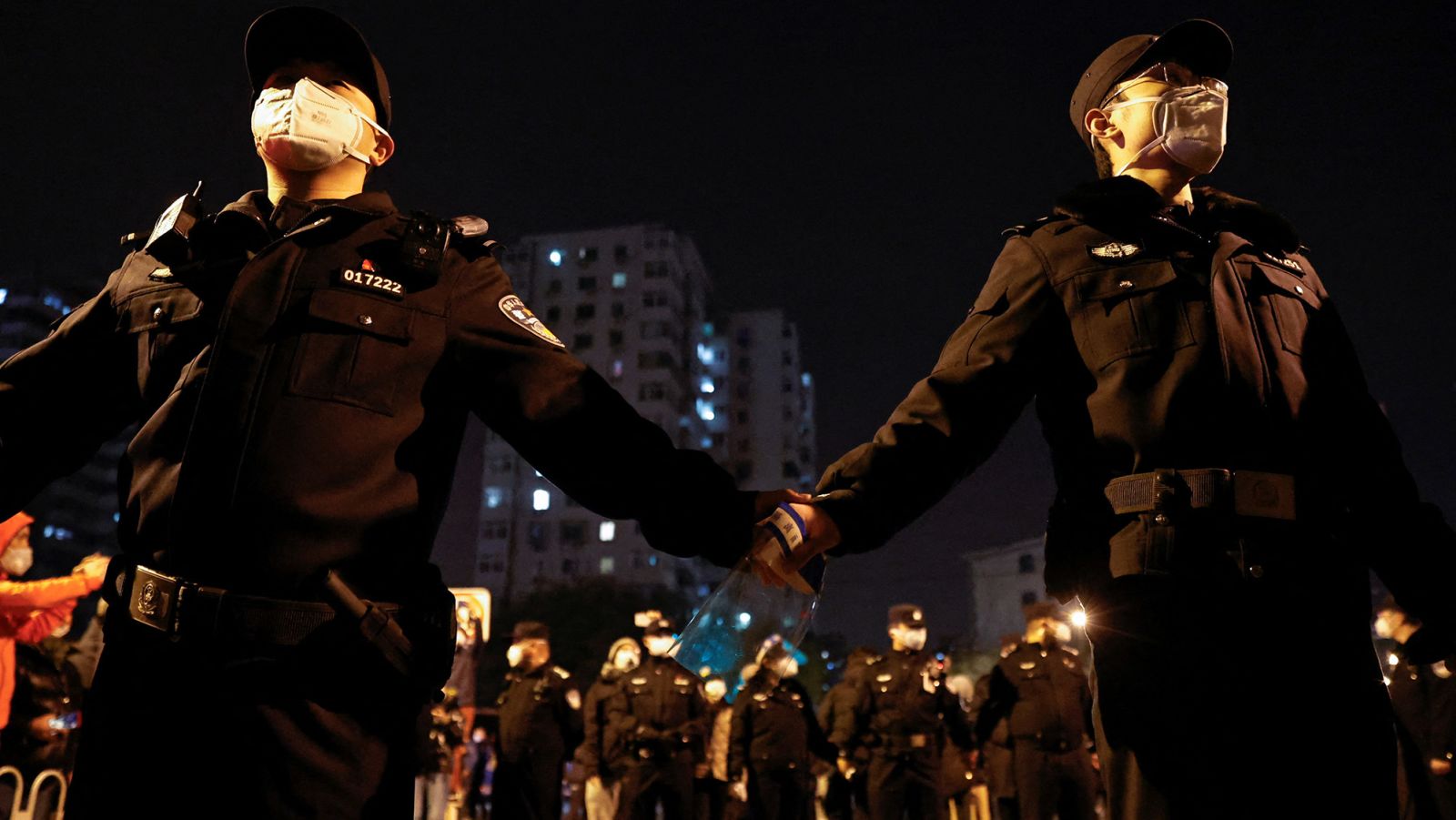Why do covid-19 cases keep growing in China?
4:29
(CNN) --
China's vast security apparatus has moved quickly to quell the massive protests that have swept the country, with police patrolling the streets, checking mobile phones and even calling some protesters to warn them of their actions.
In the main cities, this Monday and Tuesday, the police flooded the sites of the protests that took place over the weekend, in which thousands of people gathered to vent their anger at the harsh policy of zero covid.
Some even called for more democracy and freedom in an extraordinary show of dissent against Chinese leader Xi Jinping.
A heavy police presence there has deterred protesters from gathering ever since, while authorities in some cities have adopted surveillance tactics used in the far western region of Xinjiang to intimidate protesters over the weekend.
In what appears to be the first official — albeit veiled — response to the protests, China's internal security chief vowed in a meeting on Tuesday to "effectively maintain overall social stability."
Protests in China affect stationery company 0:59
Without mentioning the demonstrations, Chen Wenqing urged law enforcement officials to "resolutely strike down the infiltration and sabotage activities of hostile forces, as well as illegal and criminal acts that disturb social order," the state agency reported. Xinhua News.
advertising
The harshness of the words may be a sign that heavy-handed measures are on the way.
Although protests often occur at the local level in China, the current wave of demonstrations is the most widespread since the pro-democracy movement in Tiananmen Square in 1989. The political challenge is also unprecedented, with some protesters openly calling for Xi's resignation, the country's most powerful and authoritarian leader in decades.
Some of the boldest protests took place in Shanghai, where crowds called for Xi's ouster two nights in a row.
The sidewalks of Urumqi Street – the main site of the protests – have been completely blocked by tall police barricades, making it virtually impossible for the crowds to gather.
Ten minutes away, dozens of policemen patrolled People's Square, a large square in the heart of the city where some residents had planned to gather with white paper and candlelight on Monday night.
Police also waited inside a metro station, closing all but one exit, according to a protester at the scene.
Chinese citizens clamor for freedom as the crackdown intensifies.
Look at the shocking images
CNN is not naming any of the protesters in this article to protect them from retaliation.
One protester said he saw police checking passers-by's mobile phones and asking them if they had set up virtual private networks (VPNs) that can be used to bypass China's Internet firewall, or apps like Twitter and Telegram, which although banned in the country have been used by protesters.
"There were also police dogs. The whole atmosphere was chilling," the protester said.
The protesters later decided to move the planned rally to another location, but by the time they arrived, the security presence had already been stepped up there as well, the protester said.
"There were too many police and we had to cancel," he said.
Widely shared video on Tuesday appears to show police officers checking the mobile phones of passengers on a Shanghai subway train.
Another Shanghai protester told CNN he was one of "80 or 110" people detained by police on Saturday night, only to be released 24 hours later.
Protesters clashed with police in China.
CNN cannot independently verify the number of protesters detained and it is unclear how many, if any, remain in custody.
The protester said the detainees had their phones confiscated aboard a bus that took them to a police station, where officers collected their fingerprints and retinal patterns.
According to the protester, the police told the detainees that they had been used by "malicious people who want to start a color revolution", pointing to the nationwide protests that broke out the same day as proof of this.
The protester said police returned their phone and camera upon their release, but officers had deleted the photo album and deleted the WeChat social media app.
Protests in China.
police calls
In Beijing, police vehicles, many parked with their lights on, lined the capital's streets in eerily quiet Monday morning, including near Liangmaqiao in the central Chaoyang district, where a large crowd of protesters had gathered this Sunday night.
The demonstration, in which hundreds of people marched along the city's Tercera Vía Circunvalación, ended peacefully in the early hours of Monday under the close surveillance of rows of police officers.
Since then, some protesters have received phone calls from the police asking about their participation in the event.
Listen to protesters in China call for the resignation of Xi Jinping, challenging the zero-covid policy
One protester said she received a call from a man who identified himself as a local police officer, asking her if she was at the protest and what she had seen there.
She was also told that if he had any dissatisfaction with the authorities, he should complain to the police, rather than engage in "illegal activities" like protesting.
"That night, the police mostly took a calm approach in dealing with us. But the Communist Party is very good at punishing after the fact," the protester told CNN.
He also added that he was not wearing a face mask during the demonstration.
"I don't think omicron is that scary," she said.
But friends of his who wore masks at the protest also received calls from the police, some as late as 1 a.m., he added.
Protest against Xi Jinping spreads in China and around the world as the Chinese leader begins his third term
Even so, the protester maintained her position.
"It is our legitimate right (to protest), because the Constitution stipulates that we have freedom of expression and freedom of assembly," she said.
Another protester, who has not heard from the police, told CNN that the concern that she could be the next to be summoned weighs heavily on her day to day.
"I can only take solace in telling myself that there were so many of us who participated in the protest that they can't put a thousand people in jail," she said.
Protesters hold up blank sheets of paper during a protest in Beijing on November 28.
Meanwhile, some Beijing universities have arranged transportation for students to return home before winter break and take classes online, citing an effort to reduce Covid risks for students taking public transportation.
But this provision also conveniently deters students from gathering, after demonstrations at a number of campuses over the weekend, including the prestigious Tsinghua University, where hundreds of students chanted "Democracy and rule of law! Free speech! ".
Given the long history of student-led movements in modern China, the authorities are especially concerned about political rallies on university campuses.
Beijing universities have been the origin of the demonstrations that started the May Fourth Movement in 1919, to which the Chinese Communist Party traces its roots, as well as the Tiananmen Square protests in 1989, which were brutally crushed by the chinese army.
Wayne Chang and Yong Xiong of CNN's Beijing bureau contributed reporting.
Covid-19PandemicRestrictions






/cloudfront-eu-central-1.images.arcpublishing.com/prisa/FIJVMOBHZRWVDBKS3NAQ2M4JRE.jpg)


/cloudfront-eu-central-1.images.arcpublishing.com/prisa/MTSQ4Y67KD7UYSQ2QOVVGGYB5I.jpg)